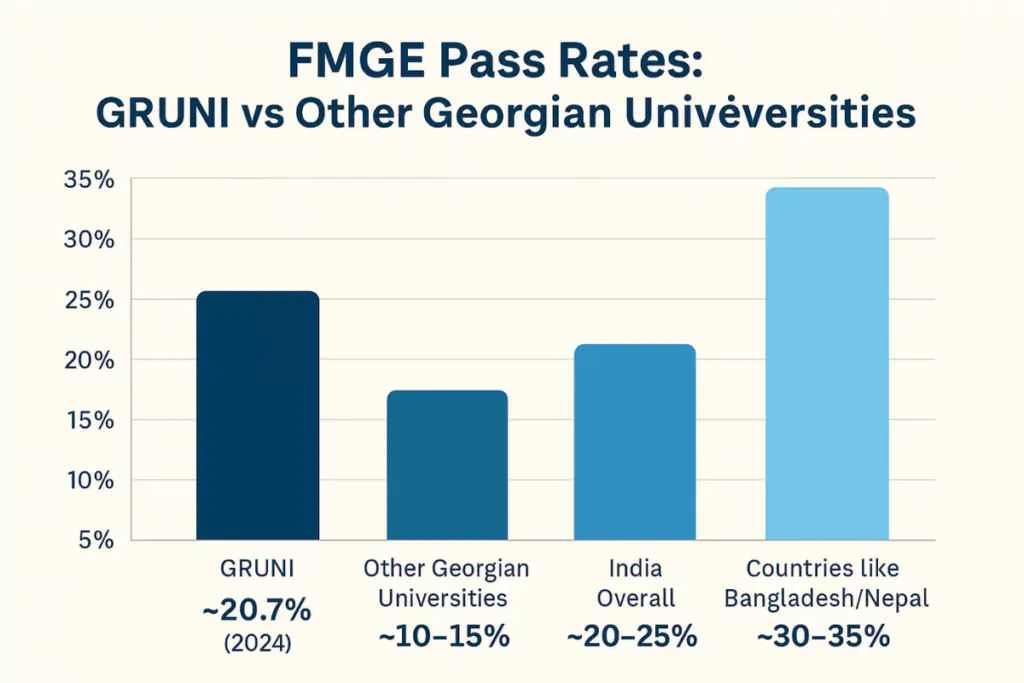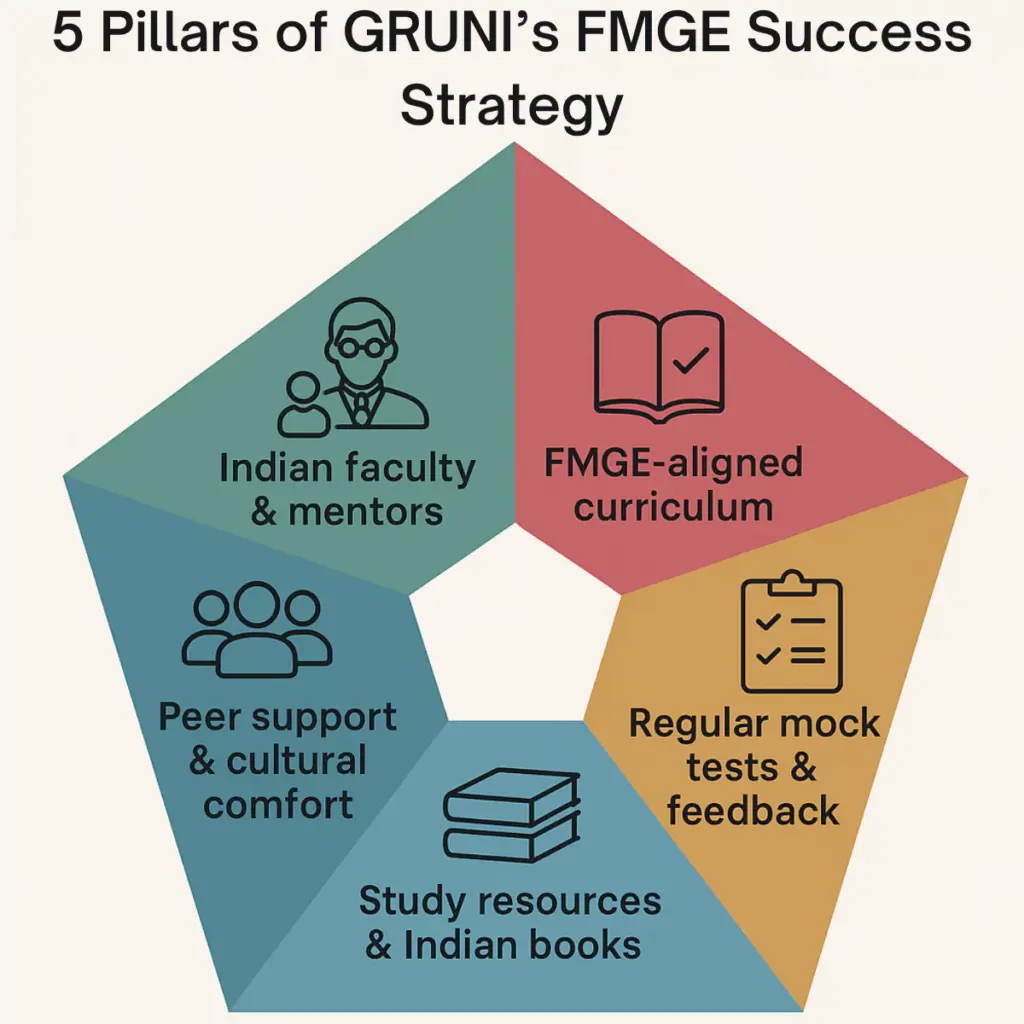Article Summary
- GRUNI offers early FMGE coaching from Day 1.
- Indian faculty and an aligned curriculum boost success.
- Regular mock tests and doubt-clearing build confidence.
- Strong peer support and resources aid exam prep.
- GRUNI’s FMGE pass rate outperforms most foreign universities.
Grigol Robakidze University (GRUNI), one of the top medical universities in Georgia, has become the first choice for Indian students. It became possible not only due to its affordable fees and English-medium education, but also because of its dedicated FMGE (Foreign Medical Graduate Examination) preparation program. For any Indian student studying MBBS abroad, passing the FMGE is crucial for practising medicine in India.
In this article, we will find out why FMGE is important, the challenges with its pass rates, and how GRUNI’s support system, from Day 1 of medical school, is enabling more Indian students to crack this tough exam.
Importance of FMGE for Indian Students Abroad
For Indian students who earn their MBBS Abroad degree, the Foreign Medical Graduate Examination (FMGE) is the gateway to practising back India. The National Board of Examinations for Medical Sciences (NBEMS) conducts FMGE as a licensure exam that foreign graduates must pass to register in India.
This exam holds very importance for a medical career because, regardless of how good one’s medical education was abroad, an Indian citizen must clear the FMGE to be licensed to practice medicine in India. This exam covers all MBBS subjects and serves as a quality benchmark to ensure foreign-trained doctors meet Indian standards.
The significance of FMGE is evident in the numbers. Twice a year, thousands of Indian graduates from countries like Georgia, Russia, China, Bangladesh, and others sit for this test. Failing means an M.D. degree without the right to practice in India. Passing, on the other hand, opens doors to internships, residencies, and medical practice. That is why students prioritise a foreign university’s FMGE track record when choosing where to study.
The Challenge: Why FMGE Pass Rates Are Low?
FMGE has a very low pass rate
- On average, only about 10–20% of the candidates manage to clear FMGE in a given session.
- For instance, in the December 2023 session, roughly 77% of the 38,000+ examinees failed, with only about 22% passing the test.
- This trend is not new, some past years saw pass rates drop to even single digits.
- Such statistics have been a major concern for Indian medical graduates abroad and their parents.
- It implies that the majority of students returning from foreign universities struggle to meet the exam’s requirements, raising questions about preparation and educational alignment.

Why do so many foreign-trained students fail?
- Experts cite a combination of factors, chiefly insufficient exam-oriented preparation and misaligned curricula.
- Many students devote five or six years to earning an MD abroad, only to realise near the end that they aren’t adequately prepared for India’s screening exam.
- Cramming in the final months is often not enough.
- In general, if students don’t get FMGE-specific coaching throughout their medical course, they find themselves struggling to catch up after graduation.
Medical curricula abroad may differ from the Indian exam.
- Teaching methods and language barriers can create knowledge gaps when students attempt FMGE’s India-centric syllabus.
- Many foreign universities focus on local licensing requirements rather than the nuances of the FMGE, leaving students to bridge the gap on their own.
- Recognising this, top countries like Georgia, Russia, Bangladesh, and Nepal often incorporate more exam-oriented training.
The solution is clear
- Start FMGE preparation from Day 1.
- Integrating FMGE coaching into the medical program ensures that students build the required knowledge base and exam skills gradually.
- Continuous practice through mock tests, exposure to Indian exam-style MCQs, and aligning coursework to FMGE topics can significantly boost confidence and outcomes.
- This is exactly where GRUNI has taken the lead.
How GRUNI Prepares Its Students for FMGE Success
- GRUNI understands that an MBBS abroad is only as good as the ability to clear licensing exams later.
- The university has therefore developed a comprehensive, FMGE-aligned support system for its Indian students from the very first year.
- This means the moment an Indian student joins GRUNI, their FMGE coaching begins in tandem with regular medical classes.
- Here’s an inside look at what makes GRUNI’s FMGE preparation approach stand out:
- Indian MBBS students at GRUNI engage in a simulation-based clinical skills session.
- At GRUNI, FMGE preparation is intertwined into daily academics from the start.
- Small-group tutorials often center on FMGE/NExT topics, using digitised Indian textbooks and regular MCQ practice as part of the curriculum.
- This early integration ensures students continuously hone exam-relevant knowledge alongside their medical studies.
Pillars of GRUNI’s FMGE support system include
Dedicated Indian Faculty for FMGE
- GRUNI employs Indian professors and FMGE coaching experts as part of its faculty team.
- These instructors, familiar with the Indian medical syllabus and exam patterns, teach key subjects and offer special review classes.
- The mix of experienced local and Indian-origin faculty ensures students get clarity on topics from an Indian exam perspective.
- Having Indian faculty “guide us like family” makes a huge difference, notes one student.
- They can draw parallels with how topics are taught in India and focus on high-yield FMGE subjects.
- Most Georgian universities have mostly local faculty and may lack this advantage, GRUNI filled it by hiring Indian faculty specifically to coach on FMGE subjects.
FMGE-Aligned Curriculum from Year 1
- GRUNI has integrated FMGE-focused modules into its 6-year MBBS curriculum.
- Instead of teaching subjects in isolation, the course is structured to meet both Georgian medical standards and Indian licensing requirements.
- From the 1st year onward, topics are taught with an eye on their relevance to FMGE.
- The program is NMC-compliant (54 months of study + 12 months internship) and mirrors the Indian MBBS syllabus structure.
- For example, after finishing a system in physiology or pathology, students might have revision sessions on how that content is tested in FMGE.
- This alignment means by the time of graduation, a GRUNI student has essentially completed multiple cycles of the FMGE syllabus.
- It’s a stark contrast to some other universities where formal FMGE coaching is absent until after graduation.

Regular Mock Tests and MCQ Drills
- One of GRUNI’s strongest suits is the frequency of internal FMGE mock exams and practice tests.
- Weekly quizzes and MCQ drills are integrated into classes for every subject.
- By routinely solving exam-style questions, students reinforce their learning and become adept at the FMGE’s MCQ format.
- Importantly, performance in these tests is tracked.
- GRUNI’s faculty uses the results to identify weak areas for each student and then conducts targeted remedial classes or tutorials.
- This continuous assessment loop, study, test, feedback, remediate, starting from the first year, is something rarely seen in other foreign universities.
Integrated Doubt-Clearing & Small Group Tutorials
- GRUNI keeps class sizes intentionally small, forming compact batches of students.
- The university enrolls about 2,800 students in total, with many Indians, but breaks them into small tutorial groups.
- This allows for high teacher-student interaction and personalised mentorship.
- Students regularly attend doubt-clearing sessions where professors (often Indian faculty for subjects like Pharmacology, Medicine, etc.) address questions specifically about tricky FMGE topics.
- These sessions might be after classes or on weekends, ensuring no student’s confusion goes unresolved.
- The mentorship culture is strong, seniors who have passed parts of FMGE or done well in mocks help juniors (peer teaching).
- GRUNI also has a dedicated Indian Student Mentorship Cell that pairs new students with senior Indian students or alumni mentors.
- The result is an environment where everyone is pushing each other toward the common goal of FMGE success.
Comprehensive Study Resources (Books, Videos, Test Banks)
- GRUNI provides its students with a wealth of FMGE-oriented resources.
- The university’s library is stocked with popular Indian medical textbooks and question banks, from Lakshya and Mudit Khanna for FMGE prep to standard texts used in Indian colleges.
- Additionally, GRUNI offers subscriptions to digital lecture series and video libraries created by Indian exam experts.
- Students can attend recorded video lectures for revision and use online test banks that mirror NBE’s question style.
- All these resources are readily available on campus, so students don’t have to self-source expensive coaching material.
- This is a big advantage over other universities, where students often buy FMGE prep books themselves or enroll in external online courses.
- At GRUNI, by contrast, such resources are part of the package, even previous years’ FMGE papers and mock question banks are provided to students for practice.
Indian Peer Group and Familiar Academic Environment
- With over a thousand Indian students on campus, GRUNI fosters a supportive Indian community abroad.
- This peer environment plays a crucial role in motivation and group study.
- Students form study circles, often state-wise or mixed, to discuss topics and quiz each other.
- The campus life is tailored for Indian comfort, from Indian mess (catering familiar food) to celebrating festivals like Diwali or Holi, creating a “home away from home” vibe.
- Culturally, this means less adjustment stress and more focus on academics.
- Moreover, GRUNI’s administration has an Indian student support office and organises FMGE-centric seminars (inviting FMGE toppers or Indian professors to give guest lectures).
- Peer learning is actively encouraged; for example, groups of Indian students use the digital library to watch FMGE coaching videos together or organise their own mini-tests.
- This constant academic buzz ensures that by the time they reach the internship year, GRUNI students feel part of an “Indian academic environment” despite being in Georgia.
- They speak in Hindi/English with peers, discuss questions in the way they would back home, and keep each other updated on NBE announcements.
- All of this nurtures an exam-focused mindset that many other foreign students lack.
In short, GRUNI’s strategy is proactive and student-centric: it anticipates the challenges of FMGE early and builds a foundation through faculty, curriculum, and community support. No wonder students often say they feel FMGE-ready even before finishing their final year.
FMGE Success Stories from GRUNI Students
GRUNI faculty (including Indian professors) are guiding students through a hands-on clinical training session. Many students and alumni credit GRUNI’s continuous mentorship and exam-oriented training for their success.
“At GRUNI, we prepare for FMGE from Day 1. Our professors, even Indian ones, guide us like family,” shares Karthik, a 2nd-year student from Chennai, emphasizing the supportive teaching culture.
His classmate Priyanshi agrees, noting that early clinical exposure and case presentations keep learning exciting and relevant for exams. These voices reflect a broader confidence among GRUNI students that they are on the right track for FMGE.
GRUNI’s FMGE track record has been steadily improving, reinforcing that its support system works. In the latest data, GRUNI achieved about a 20.7% FMGE pass rate in 2024 (with 138 out of 668 candidates clearing the exam). This places it among the top-performing private medical universities in Georgia for FMGE success.
Beyond percentages, individual success stories highlight the impact of GRUNI’s preparation. The university proudly showcases dozens of recent Indian graduates who cleared FMGE on their first attempt. Many scored well above the 150/300 passing threshold – in the 170s, 180s, and 190s.
In some instances, GRUNI alumni have achieved extraordinary scores: for example, one graduate, Dr. Gurdeep Ahluwalia from Rajasthan, scored 213/300, and another, Dr. Pushpendra Surolia, scored a staggering 285/300 on FMGE.
Such high scores (well over 90% marks) are rare and underscore the quality of training they received. These doctors attribute their performance to the early coaching and constant practice ingrained at GRUNI.
This growing alumni network serves as inspiration for current students, proving that with the right preparation, Indian students in Georgia can indeed crack the exam.
“I’ve been preparing bit by bit for five years- I don’t feel the need for a separate coaching break,” says Aditi, a final-year student, who has consistently scored above 60% in GRUNI’s internal FMGE mocks.
Such confidence is a testament to GRUNI’s integrated approach. It’s not an exaggeration to say that GRUNI has built an FMGE-cracking ecosystem, one that is yielding tangible success stories year after year.
GRUNI vs Other Universities: A Comparison
While GRUNI has set a benchmark in structured FMGE preparation, not all medical universities in Georgia offer the same level of support. Here we compare GRUNI’s FMGE support system with the situation at typical other Georgian universities that do not provide a structured FMGE prep. This highlights just how much of an edge GRUNI offers its students:
| Aspect | GRUNI (FMGE-Focused) | Other Universities (Minimal FMGE Prep) |
|---|---|---|
| Indian Faculty | Yes, has Indian professors on staff teaching FMGE subjects and guiding Indian students. | Standard curriculum focusing on local requirements; FMGE topics not emphasised until perhaps final year. Students must revise the Indian syllabus on their own time, as it’s not systematically covered. |
| Curriculum Alignment | Fully aligned with FMGE: NMC-compliant 6-year curriculum with integrated FMGE coaching modules from Year 1. Syllabus coverage mirrors Indian MBBS topics by design. | Standard curriculum focusing on local requirements; FMGE topics not emphasised until perhaps the final year. Students must revise the Indian syllabus on their own time, as it’s not systematically covered. |
| Mock Tests & Assessments | Regular in-house FMGE mock exams every semester, plus weekly MCQ quizzes in all subjects. Simulated exam environment helps build confidence early. Performance is tracked for improvement. | Infrequent or no formal mock tests. Some universities conduct a mock in the final year, but many students rely on third-party coaching centers or online mock exams. Lack of continuous testing means less exam familiarity. |
| Doubt Clearing & Mentorship | Scheduled small-group tutorials, one-on-one doubt-clearing sessions, and an Indian student mentorship cell. High teacher-student ratio ensures personalized guidance. | Large lecture halls, limited personal attention. No dedicated FMGE doubt sessions – professors stick to regular academics. Students often form informal groups or WhatsApp chats to seek clarifications without official support. |
| Study Resources | Abundant FMGE-focused study materials provided: Indian author textbooks, question banks, video lectures, past papers – all accessible in the library and online. Students have a curated prep material package on hand. | Limited resources on campus. Libraries may have only standard textbooks (sometimes in local language). Indian exam guides are usually not provided; students must buy or download materials themselves. No structured question bank from the university’s side. |
| Peer Support & Environment | Large community of Indian students (1000+), fostering peer study groups and a familiar environment. Indian food in hostels and cultural support make it easier to focus on studies. GRUNI even has an Indian Students Office to coordinate cultural and academic support. | Varies by university – some have sizable Indian cohorts, others very few. Many smaller colleges lack an Indian mess or cultural support, causing adjustment issues. Without a strong peer network working towards FMGE, motivation and group study opportunities depend on the student mix. |
| FMGE Pass Rate | ~20% in recent years and improving (even ~30% in one session). Among the higher performers in Georgia’s private institutions. Consistent coaching yields a growing number of passes each year. | Often under 15% for many institutions; some have pass rates in the ~10% range. (For example, a few Georgian private colleges saw only ~10% of their students pass FMGE.) Without structured prep, many graduates take multiple attempts or struggle to pass at all. |
Universities that do not invest in FMGE preparation leave students largely to their own devices. It’s not uncommon to hear of Indian students abroad forming self-study groups in the final year, pooling money to subscribe to online coaching, or even flying to India for crash courses after graduating. Such ad-hoc preparation cannot always compensate for years of less-focused study. This is reflected in the pass rates, colleges with no FMGE support system tend to have poor outcomes.
On the other hand, GRUNI’s concerted approach yields pass percentages that, while not yet at par with Indian colleges, significantly outperform the norm among similar overseas institutions. GRUNI demonstrates that when a university and students work together, the FMGE “screening” is no longer an insurmountable barrier but a challenge that can be met confidently.
It’s also worth noting that Georgia as a whole is trying to improve FMGE results. However, GRUNI remains a step ahead by having institutionalised this support system years ago. GRUNI’s program is not an afterthought or add-on, it’s built into the student experience from day one, and it shows in the confidence and performance of its graduates.
GRUNI: Fmge Path to Success
Choosing an MBBS abroad is a life-changing decision, and for Indian students, the end goal isn’t just the MBBS degree, but becoming a licensed doctor in India. GRUNI’s example shows that with the right guidance, resources, and early exam-focused training, Indian students can and do succeed at the FMGE. The university has created an environment where cracking the FMGE is not a distant dream but an achievable outcome of a well-structured journey.
If you’re an aspiring doctor (or a concerned parent) considering MBBS in Georgia, it’s crucial to evaluate the FMGE support offered by your university of choice. GRUNI has set a high bar in this regard, and its results are encouraging. As you weigh your options, ask: Will I be coached for licensure from the start? Will some mentors know the exam I must face? At GRUNI, the answer is a BIG YES.
With a supportive institution like GRUNI and the right preparation, you can proudly clear the FMGE and join the ranks of successful physicians.

